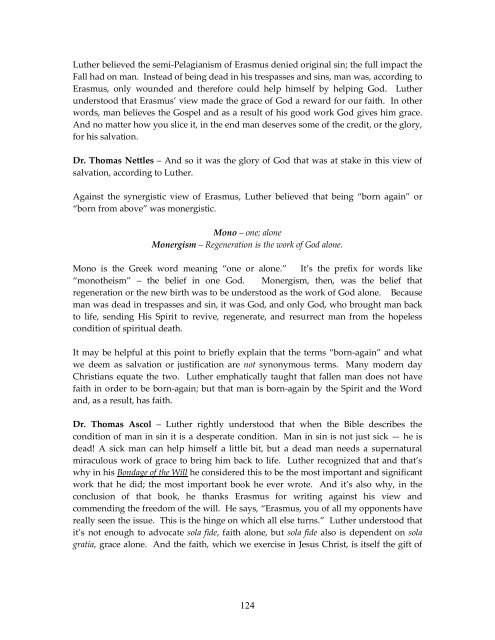AG STUDY GUIDE FINAL - The Forerunner
AG STUDY GUIDE FINAL - The Forerunner
AG STUDY GUIDE FINAL - The Forerunner
You also want an ePaper? Increase the reach of your titles
YUMPU automatically turns print PDFs into web optimized ePapers that Google loves.
Luther believed the semi-Pelagianism of Erasmus denied original sin; the full impact the<br />
Fall had on man. Instead of being dead in his trespasses and sins, man was, according to<br />
Erasmus, only wounded and therefore could help himself by helping God. Luther<br />
understood that Erasmus’ view made the grace of God a reward for our faith. In other<br />
words, man believes the Gospel and as a result of his good work God gives him grace.<br />
And no matter how you slice it, in the end man deserves some of the credit, or the glory,<br />
for his salvation.<br />
Dr. Thomas Nettles – And so it was the glory of God that was at stake in this view of<br />
salvation, according to Luther.<br />
Against the synergistic view of Erasmus, Luther believed that being “born again” or<br />
“born from above” was monergistic.<br />
Mono – one; alone<br />
Monergism – Regeneration is the work of God alone.<br />
Mono is the Greek word meaning “one or alone.” It’s the prefix for words like<br />
“monotheism” – the belief in one God. Monergism, then, was the belief that<br />
regeneration or the new birth was to be understood as the work of God alone. Because<br />
man was dead in trespasses and sin, it was God, and only God, who brought man back<br />
to life, sending His Spirit to revive, regenerate, and resurrect man from the hopeless<br />
condition of spiritual death.<br />
It may be helpful at this point to briefly explain that the terms “born-again” and what<br />
we deem as salvation or justification are not synonymous terms. Many modern day<br />
Christians equate the two. Luther emphatically taught that fallen man does not have<br />
faith in order to be born-again; but that man is born-again by the Spirit and the Word<br />
and, as a result, has faith.<br />
Dr. Thomas Ascol – Luther rightly understood that when the Bible describes the<br />
condition of man in sin it is a desperate condition. Man in sin is not just sick — he is<br />
dead! A sick man can help himself a little bit, but a dead man needs a supernatural<br />
miraculous work of grace to bring him back to life. Luther recognized that and that’s<br />
why in his Bondage of the Will he considered this to be the most important and significant<br />
work that he did; the most important book he ever wrote. And it’s also why, in the<br />
conclusion of that book, he thanks Erasmus for writing against his view and<br />
commending the freedom of the will. He says, “Erasmus, you of all my opponents have<br />
really seen the issue. This is the hinge on which all else turns.” Luther understood that<br />
it’s not enough to advocate sola fide, faith alone, but sola fide also is dependent on sola<br />
gratia, grace alone. And the faith, which we exercise in Jesus Christ, is itself the gift of<br />
124


